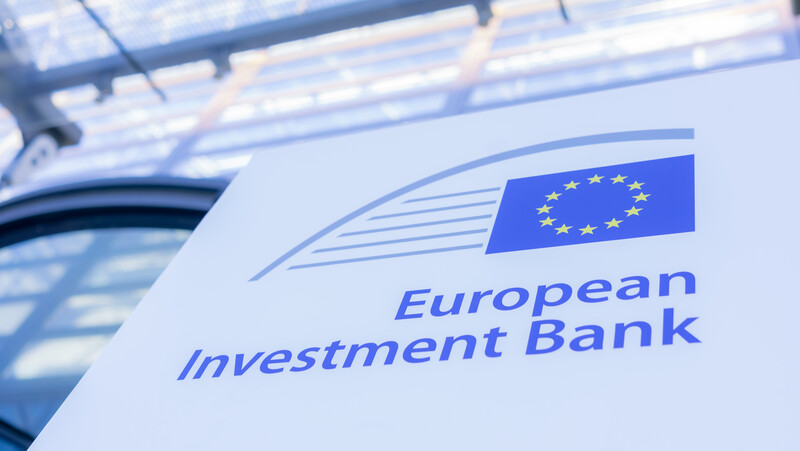Rights and Accountability 13 September 2023

The European Investment Bank has inked a “strategic cooperation” deal with supporters of Israel’s illegal settlements. (European Investment Bank)
The antics of Western diplomats have changed slightly over the past century or so.
Seventeen-gun salutes used to be considered mandatory when Britain’s top administrators arrived in or departed from Palestine between the 1920s and 1940s.
Pomp of that type appears quaint when one considers the dizzy heights scaled recently by Sven Kühn von Burgsdorff. His swansong as the EU’s ambassador to the West Bank and Gaza consisted of a paragliding stunt.
Does his successor Alexandre Stutzmann plan similar capers? It is too soon to say.The only public pronouncement which Stutzmann has made since taking up his post earlier this month contained an assurance that he is committed to a two-state solution.
Dream on, Your Excellency!
The absence of 17-gun salutes notwithstanding, the agenda pursued by white Europeans in Palestine is broadly the same as it was during the early 20th century.During the 1920s, Britain pushed forward the Zionist colonization project, while claiming to be concerned about the welfare of Palestinians.
During the 2020s, the European Union is sneakily supporting an Israeli military occupation, while claiming to be concerned about the welfare of Palestinians.
Maintaining a myth
In his new role as an ambassador, Alexandre Stutzmann will be maintaining the myth that the EU is a paragon of balance.
The diplomatic mission which he heads in Jerusalem includes an office for the European Investment Bank (EIB).
Calling itself the “world’s largest international public bank,” the EIB is an official European Union body that is demonstrably far more generous to Israel than to Palestinians.
Data published on its own website proves that fact.
The bank has loaned over $760 million to Palestinian projects since it began financing such work in 1995.
By contrast, the EIB has been financing Israeli projects since 1981. In that time, it has loaned Israel approximately $2.6 billion.
Even taking into account how the bank has been loaning to Israel for a longer period, these figures show that the Israeli oppressor benefits far more from EIB money than oppressed Palestinians – who are clearly in much more need of support especially given the devastation to their economy and infrastructure caused directly by Israeli occupation and colonization.
The problem goes much deeper than the unequal distribution of loans.
An even clearer illustration of how the EIB has sided with the oppressor is its designated “financial intermediary” in Israel. The intermediary in question – Bank Leumi – directly supports the construction and expansion of Israel’s settlements in the occupied West Bank, including East Jerusalem.
That is why Bank Leumi is listed in the UN database of companies that assist and profit from Israel’s illegal colonization of Palestinian land.
Rebranding
Bank Leumi has assisted settlements that have been singled out for criticism by the EU.
In a report published last year, the EU’s aforementioned diplomatic mission in Jerusalem stated that it was particularly concerned by the “advancement” of a few particular blueprints for settlements during 2021.
Atarot – a settlement in East Jerusalem – was among those named. Building a large number of new housing units for Jewish settlers in Atarot would “disconnect [Palestinian] East Jerusalemites from major West Bank urban areas, such as Hebron and Ramallah,” the EU paper complained.
In 2021, Bank Leumi approved a loan to Mivne Group, an Israeli real estate firm, for its work in Atarot. The bank “holds as collateral the [Mivne] company’s contractual and actual rights in the land and project,” according to Who Profits, an occupation watchdog.
Who Profits has detailed what it calls the “vast involvement” of Bank Leumi in Israel’s settlement activities. The services it and a few other Israeli banks provide to local authorities and firms are essential toward sustaining the settlements, Who Profits has noted.
It cannot be stressed often enough that Israel’s settlement activities constitute war crimes. They violate both the Fourth Geneva Convention and the Rome Statute of the International Criminal Court.
By allocating loans to these activities, Bank Leumi is abetting war crimes.
By designating Bank Leumi as a “financial intermediary,” the EIB has made itself a partner in war crimes.
The collaboration between the EIB and Bank Leumi has been sold as progressive.
When announcing that it had signed a “strategic cooperation agreement” with the EIB earlier this year, Bank Leumi claimed that the credit lines – worth more than $535 million – will boost “investment in green and environmental projects.”
In reality, the EIB has a grubby record of lavishing cash on the fossil fuel industry.
Like many other scoundrels, the EIB has been rebranding itself as an eco-warrior. As it continues to finance many dubious schemes, the rebranding will be no more than a cosmetic exercise.
It comes as little surprise that the EIB has also spun its activities in the Middle East as part of a quest for peace. So long as it teams up with a war crimes enabler like Bank Leumi, all such spin should be treated with contempt.





